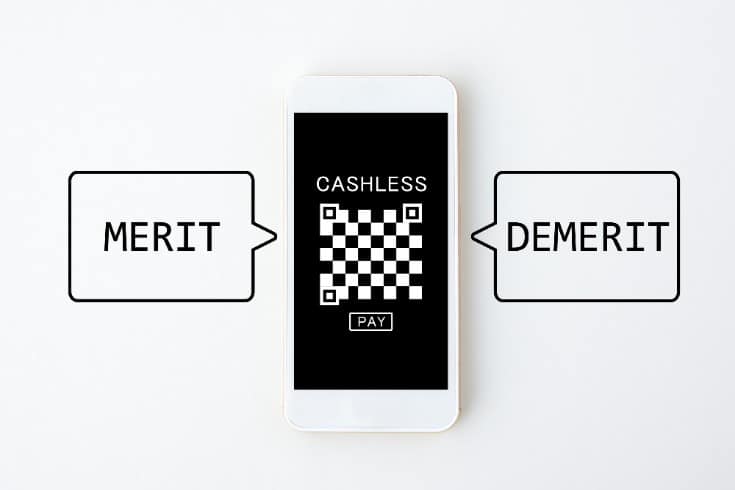What is Digital Wage Payment (Digital Salary)? Explaining Implementation Examples and Procedures

As the Japanese government aims to achieve a 40% cashless payment ratio by Reiwa 7 (2025), the cashless payment ratio in Reiwa 5 (2023) reached a record high of 39.3% (126.7 trillion yen). In response to the growing demand for cashless transactions in recent years, the Ministry of Health, Labour and Welfare legalized “Digital Wage Payments” in April of Reiwa 5 (2023).
So, how can Digital Wage Payments actually be utilized? This article will provide an overview of Digital Wage Payments, their advantages and disadvantages, and the procedures for implementation.
What is Digital Wage Payment?

Digital wage payment is a system that allows employees, with their consent, to receive their salary through electronic means—such as smartphone payment apps, prepaid cards, or digital currencies like electronic money—instead of traditional cash payments or bank transfers. This involves transferring funds to an account held by a funds transfer service provider.
A funds transfer service provider is a registered business that offers remittance services other than banks. As of August 2024, 82 companies are registered. Well-known examples include SoftBank’s ‘PayPay’ and LINE’s ‘LINE Pay’, which also provide payment functions on smartphone apps. Users can link these apps to their bank accounts to charge (deposit) money, which can then be used for sending funds or shopping.
To operate a funds transfer business, one must be registered with the Prime Minister in advance under the ‘Japanese Funds Settlement Act’. Conducting funds transfer business (foreign exchange transactions) without registration is a violation of Article 4, Paragraph 1 of the Banking Act, and will subject the unlicensed operator to the penalties under the Banking Act.
Reference: Japan Funds Transfer Service Providers Association “Overview of Funds Transfer Business”[ja]
Among the registered funds transfer service providers, only those accounts designated by the Minister of Health, Labour and Welfare can be used for digital wage payments (as of the time of writing, PayPay Corporation is the only company designated by the Minister of Health, Labour and Welfare).
Digital wage payment is one of the options available. Employers cannot force workers who do not wish to receive their wages digitally. Furthermore, employees can choose to receive only a portion of their wages in the designated funds transfer service provider’s account.
The Background of Recognizing Digital Salary Payments
The possibility of digital salary payments has emerged against the backdrop of recent advancements in digitalization and the evolving landscape of salary disbursement.
As a principle, wages must be paid in currency (Japanese Labor Standards Act, Article 24). However, with the consent of the worker, exceptions are permitted, such as wage payments into 1: bank accounts and 2: comprehensive securities accounts (Japanese Labor Standards Act Enforcement Regulations, Article 7-2).
Article 24: Wages must be paid directly to the worker in currency and in full. However, in cases where there are special provisions in laws or labor agreements, or methods of payment prescribed by the Ministry of Health, Labour and Welfare ordinance that ensure reliable payment, wages may be paid in something other than currency. Furthermore, if there are special provisions in laws, or if there is a labor union representing the majority of workers at the workplace, or if there is a written agreement with representatives of the majority of workers when there is no such labor union, a part of the wages may be deducted and paid.
Japanese Labor Standards Act
Article 7-2: With the consent of the worker, the employer may use the following methods for wage payment. However, in the case of the method listed in item 3, the employer must ensure that the worker can choose the payment method listed in item 1 or 2, and must explain the requirements listed from (i) to (viii) in item 3 to the worker and obtain their consent.
Japanese Labor Standards Act Enforcement Regulations, Article 7-2[ja]
(i) Transfer to a bank or other financial institution account designated by the worker
(ii) Payment into a custodial account with a financial instruments business operator designated by the worker (limited to those meeting the following requirements)
However, with the proliferation of internet banking and mobile banking, as well as the development of blockchain technology, digital currencies have become indispensable in our lives.
Therefore, in light of these changes, the need to revise the Japanese Labor Standards Act Enforcement Regulations to allow for salary payments into accounts managed by funds transfer service providers dealing with digital currencies was considered, paving the way for the digitalization of salary payments.
Regulations Pertaining to Digital Salary Payments
Regulations concerning digital salary payments can be broadly divided into two categories: “employer-side regulations” and “funds transfer service provider regulations.”
Employer-Side Regulations
As mentioned earlier, when an employer intends to make digital salary payments, it is necessary to obtain the consent of the employees.
In this case, employers are obligated to explain the following to their employees:
- That the account balance limit is set at one million yen or less, or that measures are in place to promptly reduce the balance to one million yen or less should it exceed that amount.
- That there is a system in place to promptly guarantee the obligations owed to employees in the event that the funds transfer service provider is unable to fulfill its debts due to bankruptcy or similar circumstances.
- That there is a system to compensate for losses incurred by employees due to unauthorized foreign exchange transactions or other reasons not attributable to the employees’ fault, which result in a loss to the employees.
- That the account balance remains valid for at least ten years from the last date it was altered.
- That funds can be received in the account in amounts of one yen or more through the use of cash automatic payment machines (ATMs), and that at least once a month, these funds can be received without incurring a fee. Additionally, that funds can be transferred to the account in increments of one yen.
- That there is a system in place to timely report to the Minister of Health, Labour and Welfare on the status of wage payment operations and financial conditions.
Funds Transfer Service Provider Regulations
As a premise, funds transfer service providers are subject to necessary regulations such as “deposit of performance bonds” and “system risk management” by the Financial Services Agency, based on the Japanese Funds Settlement Act and other laws.
However, providers that make wage payments are subject to additional requirements by the Ministry of Health, Labour and Welfare due to the inclusion of labor issues. Based on the Japanese Labor Standards Act Enforcement Regulations, the content of the employer’s explanation obligations mentioned above is imposed as specified requirements to ensure the “reliable payment of wages.”
In addition to the above, the following requirement is also imposed:
- That the provider has the technical capability to perform wage payment operations appropriately and reliably, and also possesses sufficient social credibility.
Meeting these requirements allows the Minister of Health, Labour and Welfare to designate qualified businesses based on applications from funds transfer service providers.
The Benefits of Digital Salary Payments

The benefits of paying wages digitally include the following.
Benefits for Workers
Firstly, workers can receive their salaries directly without going through a bank account.
Moreover, the salary received can be withdrawn in cash at least once a month from ATMs without any fees, even to the penny. The account balance limit for receiving salaries is set at one million yen or less, and any excess will be transferred to a bank account previously registered by the worker.
If workers wish, they can receive part of their wages in an account with a funds transfer service provider and the rest in a bank account. For example, if there is a request to receive 200,000 yen of a net salary of 300,000 yen in a bank account and the remaining 100,000 yen as a digital salary, it is possible to pay the salary in such a manner.
Benefits for Employers
Employers benefit economically as they no longer need to go through bank accounts and bear the cost of transaction fees.
Furthermore, by adopting digital wage payments, employers can showcase their commitment to improving the working environment. If a company is perceived as actively engaging with new welfare systems that are of high interest to society and employees, and as positively addressing work-style reforms and employee satisfaction, it can expect to alleviate the issue of labor shortages.
The Disadvantages of Digital Salary Payments
On the other hand, there are several disadvantages to consider when it comes to paying wages digitally.
Disadvantages for Workers
While digital payment of wages is an option for workers, it can be challenging for those unfamiliar with electronic money and related technologies. This is particularly true for older adults, who may have lower usage rates of electronic money and might need to open new accounts specifically for receiving digital salaries.
Furthermore, as mentioned earlier, accounts are typically set to have a maximum limit of one million yen. Therefore, in the case of digital salaries, any amount exceeding the one million yen limit will be automatically transferred to a predetermined bank account.
Additionally, there is the potential for delayed or failed salary payments due to system failures or cyber-attacks.
Disadvantages for Employers
For global companies, it is particularly important to be mindful of the need to comply with different regulations and laws in each country or region.
Moreover, since employee employment information is linked to salary data, there is a risk of hacking or data breaches, necessitating robust security measures regardless of the digital currency used.
Initial investments in internal system infrastructure may also be required to accommodate digital salary payments.
Case Study: Implementing Digital Salary Payments

In Japan, as of August 2024, SoftBank Group announced that 10 of its companies will start using “PayPay Salary Receipt” to accommodate digital salary payments.
Reference: SoftBank Group’s 10 companies start using ‘PayPay Salary Receipt’ for digital salary payments[ja]
The decision to adopt “PayPay Salary Receipt” was made by SoftBank Group Corp., SoftBank Corp., LINE Yahoo Japan Corporation, PayPay Corporation, SB C&S Corporation, SB At Work Corporation, SB Technology Corporation, SB Payment Service Corporation, PayPay Card Corporation, and PayPay Securities Corporation.
Employees of these group companies will receive digital salary payments through PayPay Corporation. Since PayPay Corporation is currently the only licensed funds transfer service provider in Japan, this initiative is attracting attention as the first of its kind in the country.
Reference: Ministry of Health, Labour and Welfare “Overview of PayPay Corporation’s Services”
Procedures for Implementing Digital Wage Payments
So, what procedures are necessary for employers to actually introduce digital wage payments? Here, we will explain the process and key points of these procedures.
Procedure Flow
Employers who wish to introduce digital wage payments need to follow these six steps:
- Verification of a funds transfer service provider designated by the Minister of Health, Labour and Welfare
- Evaluation of the services provided by the designated funds transfer service provider to be introduced
- Conclusion of a labor-management agreement, etc.
- Explanation to the workers
- Obtaining individual consent from the workers
- Verification and implementation of wage payment administrative processes
Points for Selecting a Designated Funds Transfer Service Provider
When selecting a designated funds transfer service provider, pay attention to the following points:
- The set maximum account balance
- The set maximum amount for daily payouts
- The presence and amount of fees
- The necessity of concluding a contract with the designated funds transfer service provider
It is also possible to choose multiple designated funds transfer service providers.
However, as of the time of writing, PayPay Corporation is the only designated funds transfer service provider.
Concluding a Labor-Management Agreement
When introducing digital wage payments, it is necessary to conclude a labor-management agreement with a labor union representing the majority of workers if one exists, or with a representative of the majority of workers if there is no union.
The labor-management agreement should include the following items:
- The scope of workers covered
- The scope and amount of wages covered
- The range of designated funds transfer service providers handled
- The start date of implementation
Additionally, the Ministry of Health, Labour and Welfare’s website[ja] provides examples of labor-management agreement formats.
Explanation to Workers & Obtaining Individual Consent
Employers are obligated to explain the aforementioned content to their workers. This explanation can also be entrusted to the designated funds transfer service provider.
Individual consent from workers can be obtained not only in writing but also through electronic records. Examples of consent forms are available on the Ministry of Health, Labour and Welfare’s website[ja].
Summary: The Future Outlook of Digital Salary Payment
As we have explained thus far, digital salary payment systems not only provide workers with new options for receiving their wages but also serve as a means of enhancing a company’s employee benefits.
While the system for digital wage payments is still in its infancy, the demand for cashless transactions is expected to continue to rise. As of September 2024, PayPay Corporation is the only money transfer business operator designated by the Japanese Ministry of Health, Labour and Welfare, but currently, three other money transfer operators have applied for designation and are under review.
If these operators receive designation from the Japanese Ministry of Health, Labour and Welfare, it will become possible to use digital currencies other than PayPay for digital salary payments, which suggests that the number of companies offering digital wage payments is likely to increase in the future.
Guidance on Measures by Our Firm
Monolith Law Office is a law firm with high expertise in both IT, particularly the internet, and legal matters. We provide legal support for the sophisticated management challenges unique to IT and venture companies, ranging from Tokyo Stock Exchange-listed corporations to venture businesses. The details are described in the article below.
Areas of practice at Monolith Law Office: Corporate Legal Services for IT & Venture Companies[ja]
Category: General Corporate
Tag: General CorporateIPO





















